Veranstaltungen und Aktivitäten
New book chapter on Japanese occupation of China

DIJ historian Torsten Weber has contributed a chapter on Chinese Asia discourse to the sourcebook Translating the Occupation. The Japanese Invasion of China, 1931–45, published by the University of British Columbia Press in February 2021 and edited by Jonathan Henshaw, Craig A. Smith, and Norman Smith. It is the first English-language volume to provide a diverse selection of important primary sources on Japan’s occupation of China translated from Chinese, Japanese, and Korean. Torsten’s chapter „Finding China’s ‚Asia‘ in Japanese Asianism“ studies how Chinese elites in the pro-Japanese Reorganized National Government (1940-45) tried to find a balance between cooperation and resistance to Japan by appropriating Japanese Asianist rhetoric of a ‚New Order in East Asia‘ and an ‚East Asian League‘. This chapter draws on his earlier research on Japanese and Chinese Asianism and his monograph Embracing ‚Asia‘ in China and Japan. Asianism Discourse and the Contest for Hegemony (Palgrave 2018).
Online cooperation meeting with University of Vienna
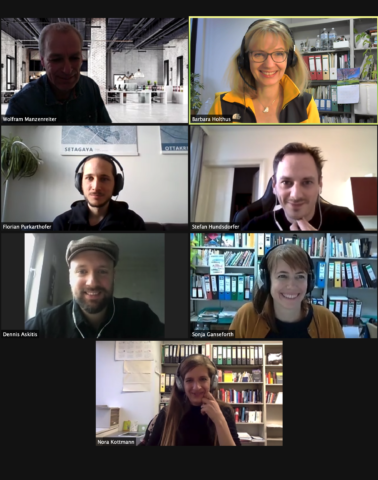
On February 4, seven researchers from the DIJ and its cooperation partner at the University of Vienna met online. Due to the pandemic, Vienna doctoral students are forced to modify their Japan research: travel to Japan has not been possible for over a year, and the doctoral students turn to hiring a Japanese company to conduct survey research on their behalf. DIJ deputy director Barbara Holthus and DIJ researchers Sonja Ganseforth and Nora Kottmann, who have all conducted their own surveys in Japan provided hands-on advice on research companies, costs involved, possible sampling strategies, questionnaire construction and the importance of sharei (incentives). Former DIJ PhD students Florian Purkarthofer and Dennis Askitis as well as Stefan Hundsdorfer, who are all currently doctoral students at Vienna, attended the meeting. It was part of the tight-knit cooperation between the DIJ and Japanese Studies at the University of Vienna. The cooperation started in 2010 with Wolfram Manzenreiter, who also participated in the online meeting, joining the editorial board of Contemporary Japan. Since 2014, one DIJ researcher per year has been teaching a class in Vienna.
Blog posts introduce survey on unmarried adults in Japan
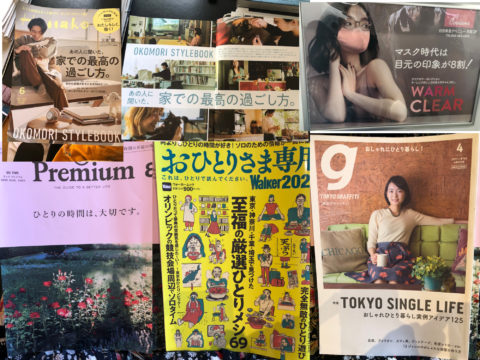
Being single is an increasingly common experience for Japanese adults. Not only has the average age at first marriage risen continuously over the last decades, so too has the rate of permanent singlehood. Research on the unmarried is therefore critical to an understanding of contemporary Japanese society. DIJ social scientist Nora Kottmann and Laura Dales (University of Western Australia) are currently conducting a survey that aims to better understand how the lives and relationship worlds of unmarried adults (‘singles’) have been affected by the ongoing COVID-19 Coronavirus pandemic and how this might affect future practices and perceptions of the increasing numbers of ‘singles’ in Japan (and beyond). Both researchers introduce this survey in their recent co-authored blog posts ‚Solo-camping and solo-hotpots: Rethinking practices and perceptions of singlehood in Japan in COVID-time‘ and ‚Looking to capture practices of intimacy in times of social distancing: Mixed-methods research on singles in Japan‘. Updates will be published on the project’s webpage.
Free access to highlight article from Asian Business & Management
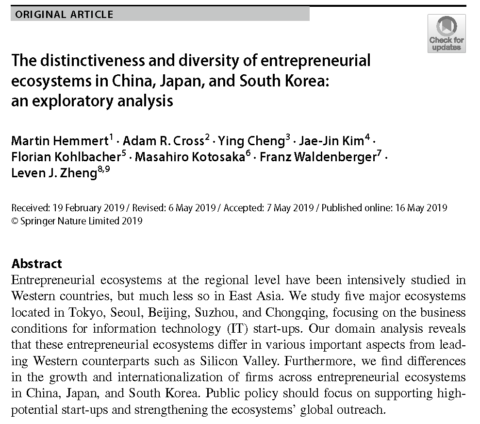
An article co-authored by DIJ director Franz Waldenberger was selected by Palgrave Macmillan and the editorial team of the Asian Business & Management journal as best content and can now be accessed for free. The original article „The distinctiveness and diversity of entrepreneurial ecosystems in China, Japan, and South Korea: an exploratory analysis“ by DIJ alumni Martin Hemmert and Florian Kohlbacher, Adam R. Cross, Ying Cheng, Jae‑Jin Kim, Masahiro Kotosaka, Franz Waldenberger, and Leven J. Zheng studies five major ecosystems located in Tokyo, Seoul, Beijing, Suzhou, and Chongqing. It focuses on the business conditions for information technology (IT) start-ups and reveals that these entrepreneurial ecosystems differ in various important aspects from leading Western counterparts, including in the growth and internationalization. It concludes that public policy should focus on supporting high-potential start-ups and strengthening the ecosystems’ global outreach. The article is an outcome of the DIJ research project Start-ups in Asia – the role of agglomerations and international linkages and can be accessed here.
New working paper on ‚Unconventional Monetary Policy‘
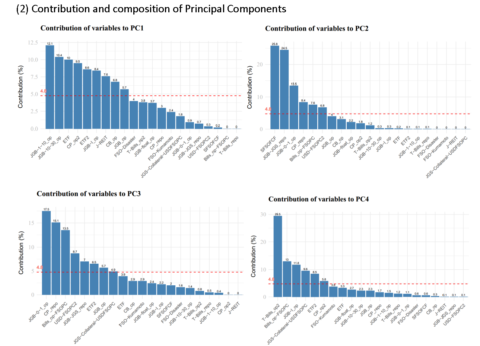
A new working paper, co-authored by Senior Research Fellow Markus Heckel and Kiyohiko G. Nishimura (Graduate Institute for Policy Studies GRIPS/Center for Advanced Research in Finance CARF, University of Tokyo) examines the unconventional monetary policies of the Bank of Japan from 2002 to 2019 with a focus on open market operations. The CARF working paper Unconventional Monetary Policy through Open Market Operations: A Principal Component Analysis applies a principal component analysis to investigate the complexity of the operations. The authors find that four principal components (PCs) explain most of the variance of the Bank of Japan’s operations of various facilities and measures. They also observe that open market operations of the Shirakawa era (2008-2013) were the most complex, resulting in an increased number of PCs. In contrast, the corresponding number in the other eras has been at most two (Fukui, 2003-2008) and four (Kuroda, 2013-present). This paper is a result of Markus‘ research project Economic Discourses of Monetary Policy – The Case of the Bank of Japan.
Barbara Holthus im DLF Kultur-Interview zu Tokyo 2020

Ein halbes Jahr vor der geplanten Eröffnung der olympischen Spiele hat Soziologin und stellvertretende Direktorin Barbara Holthus im Interview mit DLF Kultur die geschwundene Olympia-Begeisterung in Japan kommentiert. Die Euphorie von 2013, als Tokyo die Spiele zugesprochen wurden, sei Skepsis und Unverständnis über die ausufernden Kosten gewichen. Meinungsumfragen zufolge befürworteten aktuell rund 80% der Bevölkerung eine Absage oder neuerliche Verschiebung. In der andauernden Pandemie bestünde zudem die Gefahr, dass „Olympia zu einem Super-Spreader-Event würde“, so Holthus. Dennoch wolle „Tokyo unbedingt diese Spiele haben, komme was wolle“. Barbara Holthus ist Mitherausgeberin des Olympia-Buches Japan through the lens of the Tokyo Olympics (Routledge 2020, open access), das Japans Gesellschaft, Politik und Wirtschaft anhand der Vorbereitungen auf Tokyo 2020 untersucht. Das DLF-Interview kann hier nachgehört werden.
Review of special issue on Max Weber by Yufei Zhou
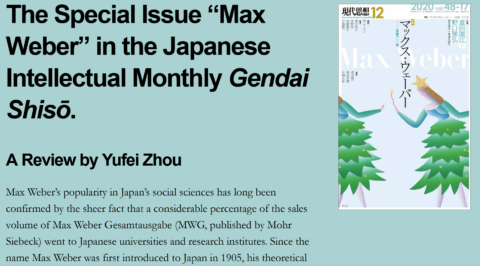
Max Weber’s popularity in Japan remains unbroken. To mark the 100th anniversary of his death, the prestigious intellectual journal Gendai Shisō (現代思想) has published a special issue (12/2020) dedicated to his works and intellectual influence. Leading Japanese intellectuals and Weber scholars have contributed 24 essays to this issue, including Mishima Ken’ichi („Disenchantment Reconsidered“), Suzuki Masahiro („Weber in Contemporary Chinese Thought“), and Konno Hajime („Imagining Max Weber as a Prophet“). For the Max Weber Foundation’s blog „Max Weber in der Welt“, our Senior Research Fellow and historian Yufei Zhou has written a detailed review of this special issue which introduces the individual contributions.
Franz Waldenberger in der ZEIT zur Wirtschaftspolitik in Japan
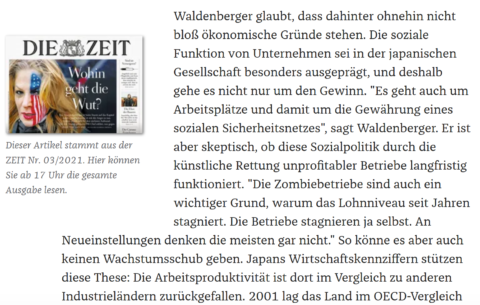
DIJ-Direktor und Ökonom Franz Waldenberger hat sich in der aktuellen Ausgabe der ZEIT (3/21) zur Strategie der japanischen Regierung geäußert, durch staatlich garantierte Kredite sogenannte „Zombieunternehmen“ künstlich am Leben zu halten. „Die Nullzinspolitik sorgt dafür, dass der Ausleseprozess zwischen produktiven und unproduktiven Unternehmen schwächer wird.“ Gleichzeitig erklärte er, dass diese Subventionen unprofitabler Betriebe in Japan eine soziale Funktion erfüllten. „Es geht auch um Arbeitsplätze und damit um die Gewährung eines sozialen Sicherheitsnetzes“, betonte Waldenberger. Der Artikel „Land der Zombies“ ist hier auch in der Online-Ausgabe zu lesen.








 Open Access
Open Access 
